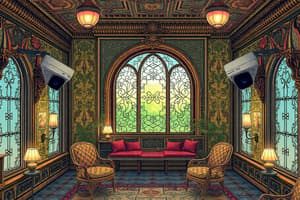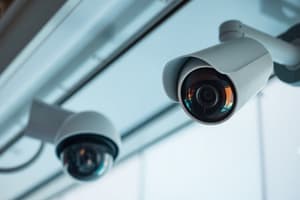Podcast
Questions and Answers
Only IP CCTV systems can capture and store video footage digitally.
Only IP CCTV systems can capture and store video footage digitally.
False (B)
CCTV observation surveillance is used to encourage criminal activity.
CCTV observation surveillance is used to encourage criminal activity.
False (B)
CCTV observation surveillance can provide real-time monitoring.
CCTV observation surveillance can provide real-time monitoring.
True (A)
CCTV cameras are only used for security purposes.
CCTV cameras are only used for security purposes.
CCTV systems do not have any limitations or concerns.
CCTV systems do not have any limitations or concerns.
Analog CCTV systems are more scalable than IP CCTV systems.
Analog CCTV systems are more scalable than IP CCTV systems.
Flashcards are hidden until you start studying
Study Notes
Question: CCTV Observation Surveillance
Definition
- CCTV (Closed-Circuit Television) observation surveillance refers to the use of video cameras to monitor and record activities in a specific area.
- It is a type of surveillance that uses cameras to observe and record individuals, often in public spaces, for security, law enforcement, or other purposes.
Purpose
- To deter criminal activity, such as theft, vandalism, and violence
- To aid in the investigation and prosecution of crimes
- To enhance public safety and security
- To monitor and manage traffic flow and pedestrian activity
Types of CCTV Systems
- Analog CCTV systems: use analog cameras and recorders to capture and store video footage
- IP CCTV systems: use internet protocol (IP) cameras and recorders to capture and store video footage digitally
- Hybrid CCTV systems: combine analog and IP cameras and recorders to provide a flexible and scalable surveillance solution
Components of a CCTV System
- Cameras: capture video footage and transmit it to the recorder or monitor
- Recorders: store video footage and allow for playback and analysis
- Monitors: display video footage in real-time
- Cables and connectors: connect cameras, recorders, and monitors to form a complete system
Advantages
- Deterrent effect: can discourage criminal activity
- Evidence collection: provides video evidence for investigations and prosecutions
- Real-time monitoring: allows for immediate response to incidents
- Cost-effective: can be a more cost-effective solution than human observation
Limitations and Concerns
- Privacy concerns: raises concerns about individual privacy and the potential for misuse
- Technical issues: can be affected by technical issues, such as camera malfunction or data loss
- Operator bias: operators may have biases that influence their interpretation of video footage
- Regulatory compliance: must comply with relevant laws and regulations, such as data protection and privacy laws
Studying That Suits You
Use AI to generate personalized quizzes and flashcards to suit your learning preferences.




